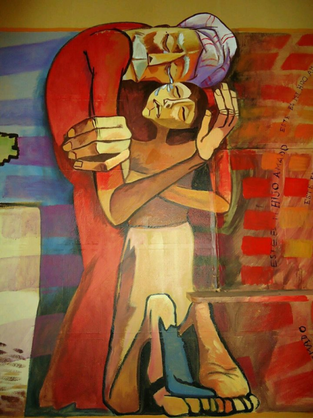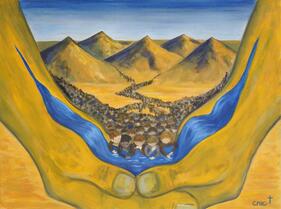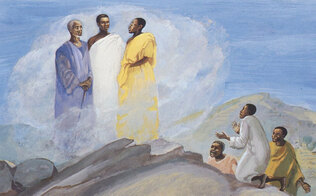
Luke 15: 1-3, 11b-32
Surprise, surprise, it turns out that Jesus didn’t have an ideal family life! Below is a recently unearthed transcript of Jesus’s younger brother James’s encounter with a therapist.
James: Lately I've been having this feeling that Mom loves Jesus more than me. Seems like everything he does is just perfect in her eyes--it's like she thinks the guy walks on water.
Doctor: James, it's really very common for a younger brother to have feelings of jealousy about an older brother. You just have to realize that it's in your own mind. He probably feels the same way about you. Tell me what makes you think your parents favor Jesus.
James: Well, the time that Jesus did walk on water, Mom was all "Jesus-does-miracles" this and "Jesus-does-miracles" that...
Doctor: You sound angry.
James: How would you feel if your brother was God?
Doctor: James, James, James... It's natural that a younger brother would put his brother on pedestal, but at a certain point you need to grow up and come to think of him as a peer.
James: No, really, I mean he actually is God.
Doctor: Have you ever confronted Jesus with your feelings?
James: Yes, and he gives me this patronizing sermon about how I'll be fine because the meek are going to inherit the earth anyway. I mean, I may not be the sharpest nail in the carpenter's box, but I can tell a left-handed compliment when I hear it.
Doctor: You know, life isn't always fair. Sometimes one brother gets more attention than another. You're just going to have to learn to deal with that and realize that while, to you, your big brother is always going to seem larger than life, to most people he'll just seem like a regular guy.
James: I know, I know. And it's not like I'm not proud of his accomplishments. I just wish he wouldn't lord it over me.
Sibling rivalry. Since there have been families with more than one child, there have been struggles between offspring. The first recorded sibs in the scriptures, Cain and Abel, reveals an older brother, Cain, envious of God’s preference of younger brother’s Abel’s sacrifice. Resentful, Cain kills his brother, and defiantly responds to God, “Am I my brother’s keeper?” This is a question that has haunted the entire history of human relations.
The parable that Jesus tells the religious elders is a spin off of the Cain and Abel story, we know it as the parable of the prodigal son. The predominant focus of the story down through the ages is the stunning rebellion of the younger son who demands his inheritance in the most scandalous fashion, leaves town and spends it all on dissolute living. Contrast to the younger son is the faithful, obedient elder son, who is pushed to rage and resentment at the unconditional love and mercy of the father who treats the return of the younger son with lavish, unconditional love. The father doesn’t punish the younger son for pain and social humiliation he’s put his family through. Instead, the father’s first act is to run to his son (a very shocking and undignified act for a man of renown in the ancient world; servants ran, wealthy men didn’t), and he immediately embraces and kisses him. Next, he calls for the son to be given a robe, a ring, and sandals, all which symbolize the restoration of the wayward son to a prominent rank in the family, his authority and status reinstated. Finally, to top it off, the father calls for the fatted calf to be killed so a grand feast can be celebrated to mark the prodigal’s return. We are so focused on the father’s extravagant love that our attention has been turned away from the unresolved tension in the story: the relationship between the brothers. The Cain and Abel complex all over again.
In the ancient world, the firstborn male child held a special place of privilege and honor. The first born was believed to prove the virility of a man and the fertility of a woman. In many cultures such a child was thought to belong to the gods. Child sacrifice of the firstborn was a common practice as a way of returning the child to the gods, thus ensuring future fertility. In the Bible, this practice was replaced by an elaborate system of redemption, where the parents paid an extra offering to the Temple to “buy back” the child from God. The firstborn inherited a double portion of his father’s estate. The firstborn received the father’s blessing and place of leadership and privilege in the family clan system. This system of dedication of the firstborn was actually extended to animals and crops as well. It is where we get our system of tithing, the returning of our first 10% of income to God through giving to the church and charities.
The elder boy in Jesus’ story, by dumb luck has the place honor and privilege. Yet despite all he has, like Cain, he becomes resentful when the younger brother is accorded special honor. Notice that the elder son does not engage his younger brother – doesn’t try to talk him out of his crazy plans, or does he try to seek him out once he left. The elder son is incandescent with rage that the younger son was received back with love, honor and festivities when he returns home after shaming his family by his sinful living. The elder son expected the typical response, which would have been a formal shunning of the young man by the clan and community. If the father won’t behave according to the cultural norms of the day, the elder son gladly steps in and refuses to engage the feast, much to the sorrow of the father.
God (or the father in the story), upsets this established human order. It is the nature of God’s love is to restore a balance that includes all peoples in God’s blessings. God’s home is a place where everyone is loved, forgiven and has a place of honor and privilege. All are precious in God’s eyes, the elder and younger son alike.
The Cain and Abel dynamic is alive and well in our world as in Jesus’ parable. We live, by dumb luck, in what traditionally is called “the first world” with its double portion of the world’s resources. One in six of the world’s children living in extreme poverty doesn’t cause a ripple in the media; instead, we hear of the top 15 billionaires grew their wealth by 65 percent during the coronavirus pandemic. Such imbalance creates great unrest and division in our world. Look at the conflict playing out between Russia and Ukraine. Older brother striking out in a deadly fashion against the younger one.
Cain and Abel battle in our hearts. Who hasn’t, like the older son, been judgmental of others’ behavior? Who hasn’t felt, from time to time, envious or refused to let go of resentment? Who hasn’t refused to be gracious and forgiving to an offense? Who hasn’t failed to be grateful for blessings received?
Who hasn’t, like the younger son, sought love and acceptance in all the wrong places? Who hasn’t had to come to their senses with an I’m sorry, I’ve sinned against heaven and you. Who hasn’t had to face someone they’ve hurt and risk rejection? Who knows what it is like to be lost? The bottom line is 1`have sinned, both need each the great love and mercy of God as depicted by the Father in the story. That’s the balance God restores to us in Christ.
Jesus the firstborn, our divine brother, restores the balance on the cross. In our final weeks of Lent, let us contemplate how we can bring our fighting and discord to our Gracious God, who is waiting to run out and meet us, to robe us with righteousness, to put the ring of belonging on our finger, to give us shoes of honor, and to call for the feast, because what has been lost is now truly found. God’s forgiveness saves us. So may we forgive lavishly as well, and restore divine order to the family of faith, creating a human family to which all belong, through the love and mercy of God. amen





 RSS Feed
RSS Feed